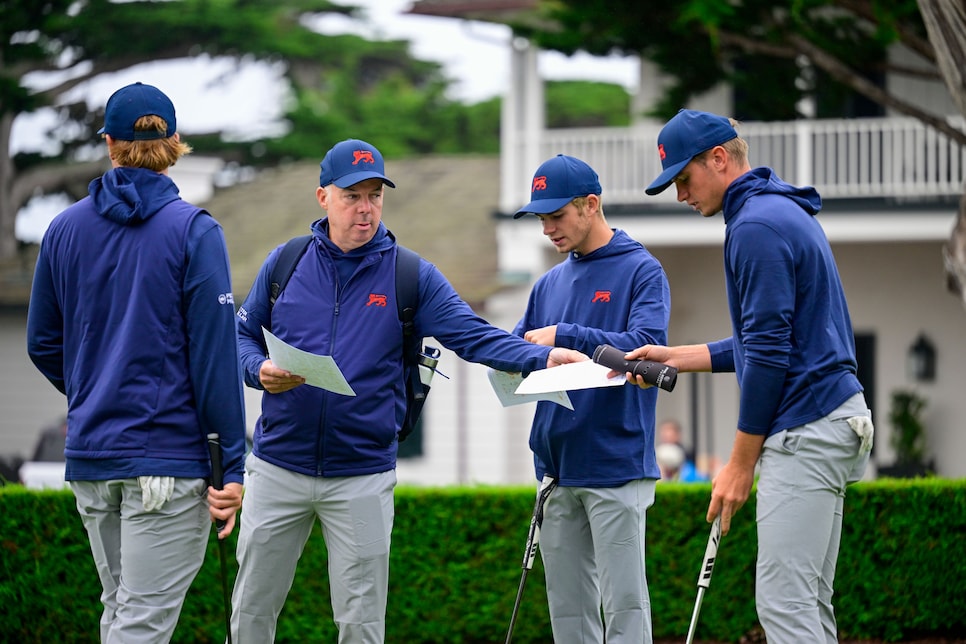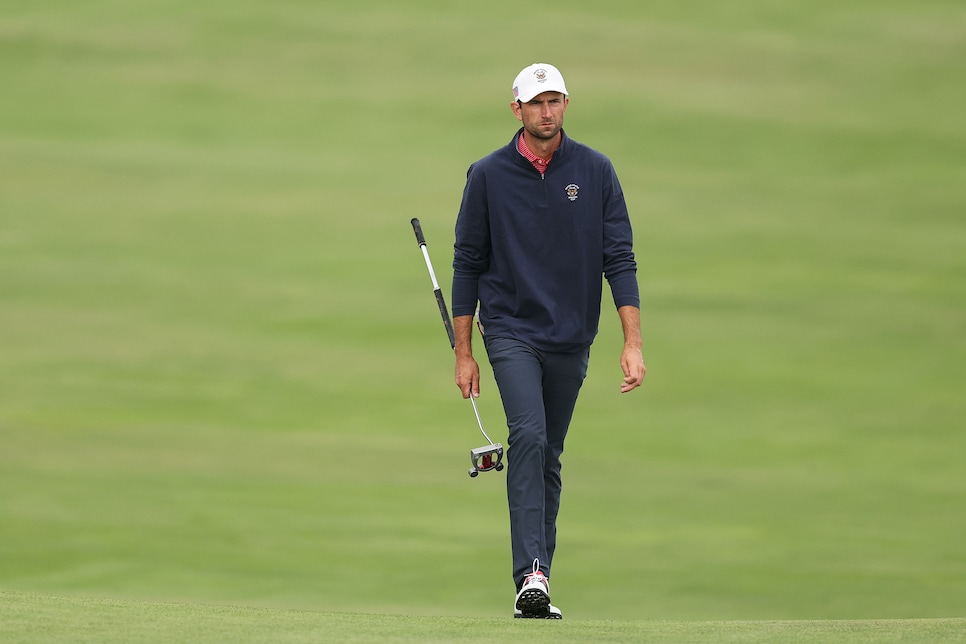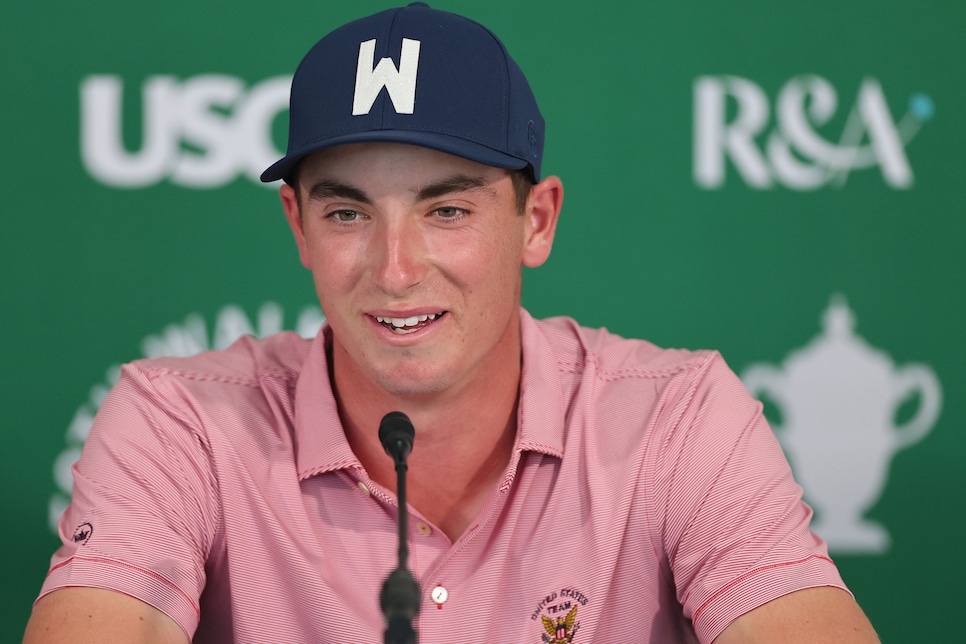PEBBLE BEACH — Blink and there’s a risk of missing the actual Walker Cup. A week’s worth of pomp and circumstance—practice rounds, dinners, flag-raising ceremonies—proceeds the two-day sprint of a competition between the best amateurs golfers from the United States against their counterparts from Great Britain & Ireland. Teams understandably arrive early, anxious and excited to get acclimated to the host course, in this case breathtaking Cypress Point. But the build-up to the actual event has the potential to set up a trap that can doom a team’s chances before the competition begins for real.
Pre-tournament burn out.
Dean Robertson, captain of the GB&I squad and a competitor in the 1983 Walker Cup at Interlachen, was warned about this from past players and captains as he made his preparations for bringing his squad out to the Monterey Peninsula. So real was his concern, that Robertson did something a bit out of the box in planning his team’s schedule after their arrival in California.
On Tuesday he gave the team the entire day off.
“It’s a very tiring week, and having spoken to friends and Padraig Harrington, Luke Donald and others, the energy levels are going to be so important,” Robertson said. “So to take that rest day on Tuesday was really important.”
The long week got off to an ominous start for the GB&I team last Friday when the bus taking them from the airport in San Francisco to Pebble Beach broke down, leaving them stranded on the side of the road for a few hours. Eventually, they all had a good laugh about the situation, but it was another instance in trying to figure out how to best handle players emotions and anxiousness.
“The nervous energy is elevated as soon as you get on the golf course here, so we enjoyed that day [away]. And Wednesday and today have been really good.”
Tyler Weaver, at No. 10 the top-ranked player on the GB&I squad, said he used the day to get some extra sleep, then got in a gym session and played a few video games.
“It takes a lot of mental energy to play these matches,” said Niall Shiels Donegan, explaining how the down time provided more than just a physical break but a psychological one too before the matches arrived.
When the GB&I squad got back to work on Wednesday, Robertson and his squad took a more regimented approach to learning the course, playing 18 holes in fivesomes. The same occurred on Thursday as if the team turned a corner on their concentration efforts as part of their strategy to win on the road for just the third time since the match’s inception in 1922.
Nathan Smith, the American captain, has played in three Walker Cups himself so he too knows the perils of peaking too early in the week. His approach as captain has been to listen to his players and allow them to prepare in the manner they best see fit. Instead of a series of 18-hole days, he’s had his players play nine-hole matches. To give their minds a break from the competition, the team spent Monday playing Pebble Beach.
“It just getting your rest,” Smith said. “It’s a long week. You’ve got to pace yourself. Probably some little things like that. … I think it’s definitely something that we’re monitoring. Whatever they need to play their best over the weekend, we’re going to do that.”

GB&I captain Dean Robertson gave his team Tuesday off, but since then has taken a more regimented approach to preparing for the two-day competition.
Logan Whitton
Some of what Smith is trying to do to address this is help handle things on the back end that will make things go more smoothly when the team is away from the course. For instance, Smith has had the players pre-order their meals for the evening, a simple enough concept that allows them to get back to their rooms—they’re staying at the nearby Inn at Spanish Bay—as early as possible.
Suffice it to say, the American players seem to have enjoyed the freedom Smith has given to take it easy early in the week and slowly build up the intensity of their preparation heading into the weekend.
“I think a big thing is keeping it light by playing a lot of games with each other. Not getting too serious,” said Ben James, who play for the victorious U.S. team at St. Andrews in 2023 and is one of two American players with previous Walker Cup experience. “These last few days have been getting more intense. But leading up to the last couple of days it’s been very light and very casual. We haven’t done anything too serious. Just learn the golf course, enjoy the golf course for sure. Just have some fun.”
As crazy as it sounds, James says that the off-course distraction of school allows him to re-center during the week and not get too wrapped up in the competition. James started his junior year at Virginia last week and has some homework to attend to while in California.
Stewart Hagestad is playing in his fifth Walker Cup for the Americans. At 34, the three-time U.S. Mid-Amateur champion is nearly twice the age as 18-year-old teammate Mason Howell, the reigning U.S. Amateur champion. The thing that he’s helped stress to his teammates this week is that it’s fine to not be grinding from sunrise to sunset every day, but that when you are practicing on the course, just make sure to be present and using that time to the max.
“Be intentional. Be super focused the time you’re out there.”

U.S. Walker Cup captain Nathan Smith is trying to keep his team loose during the week so that they conserve their energy for the actual competition.
Michael Reaves/R&A

Stewart Hagestad, a five-time Walker Cup participant, says don’t need to practice from sun-up to sundown during the week but need to make the practice they do put in matter.
Michael Reaves/R&A

Ben James says part of handling Walker Cup week is allowing yourself to soak up memories.
Michael Reaves/R&A
Hagestad says the biggest advantage he might have on others from his past experience is that he knows the cadence of the week. “You know you’re going to have to do media. You know you have to do signings. You know some nights are going to take more energy out of you,” he said. “I think with all that you have a much better game plan. So there are those little things, and you definitely adjust for those. But like holistically, you just have a better idea what the steps are in the dance. “
The good news, Hagestad said, is that he also has an idea of various “check points” during the week in which the teams he’s played on that have done well have started to peak. He thinks he’s seeing good things from the Americans as the weekend starts to come more into focus.
So what’s the best way to handle the long week? James might have hit on it when he says that it’s about knowing when to be focused and knowing when to let the moment soak in.
“Just to enjoy it as much as possible,” James said. “We had such a great time over there in St. Andrews. I’ve said to a few people, being on a Walker Cup team is really special. Everyone kind of has their own stories from each team. And it’s cool that we get to make ours … have our own jokes and make our own memories.”
Ones he hopes includes celebrating a victory come Sunday.
This article was originally published on golfdigest.com




